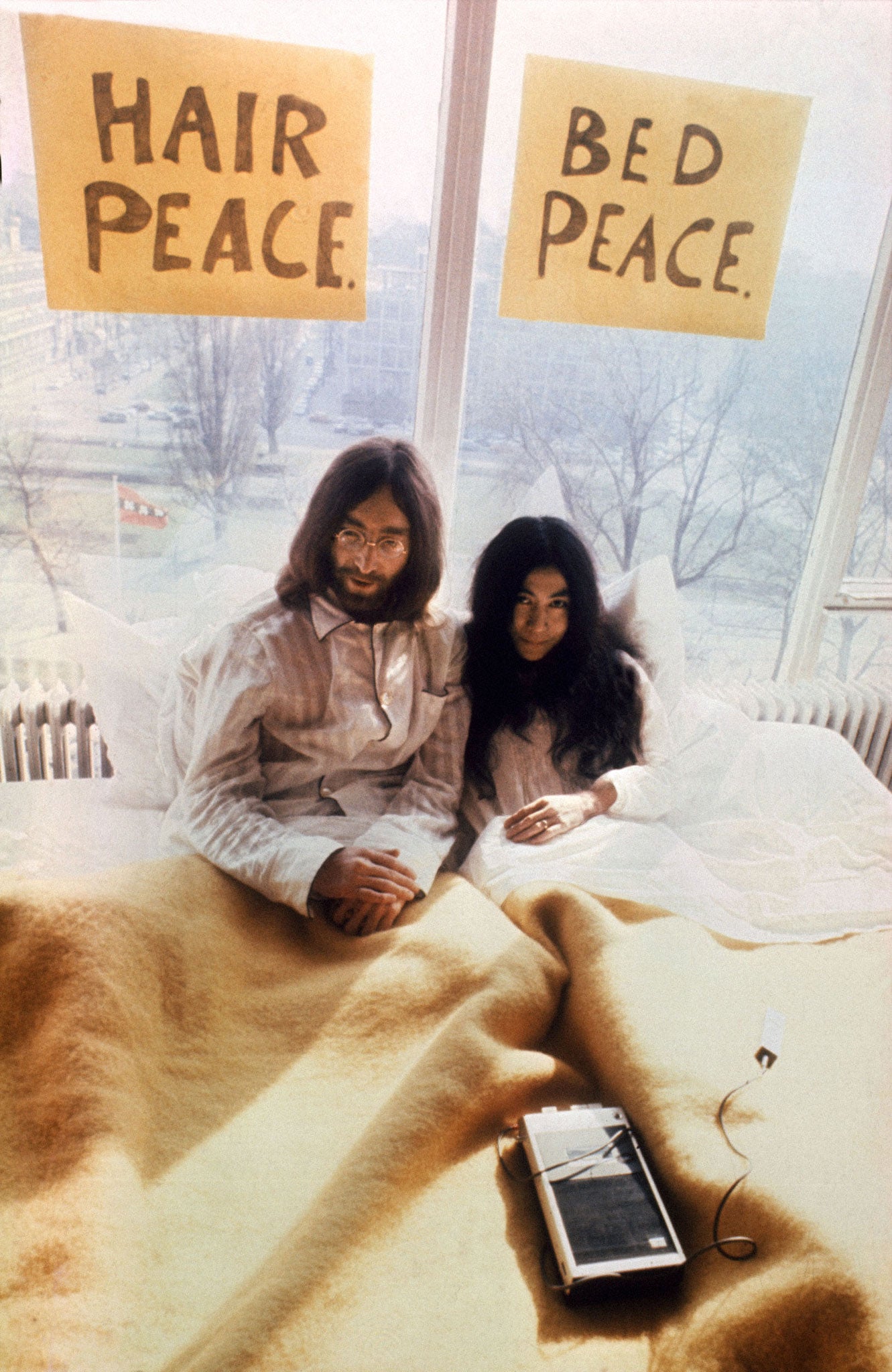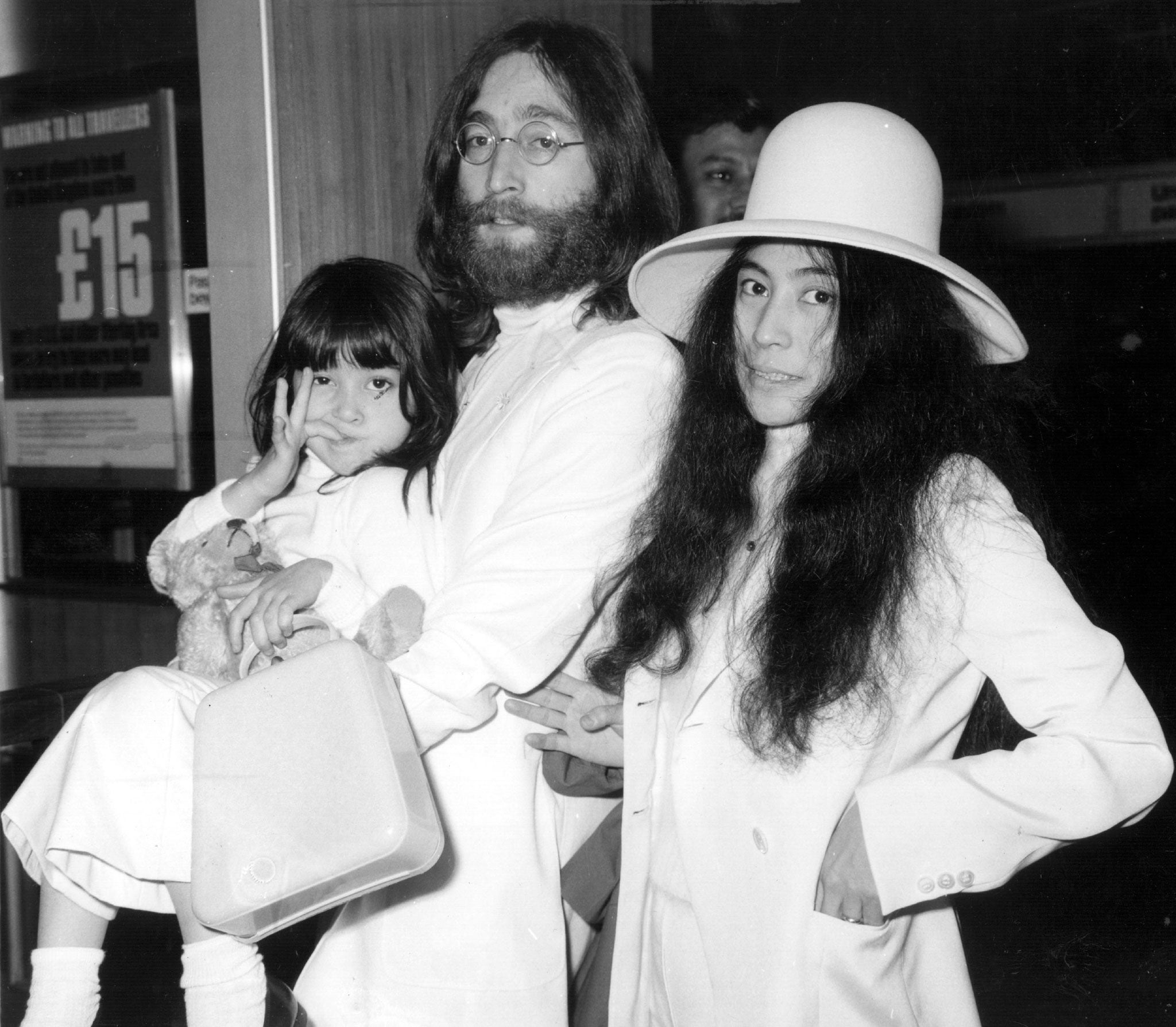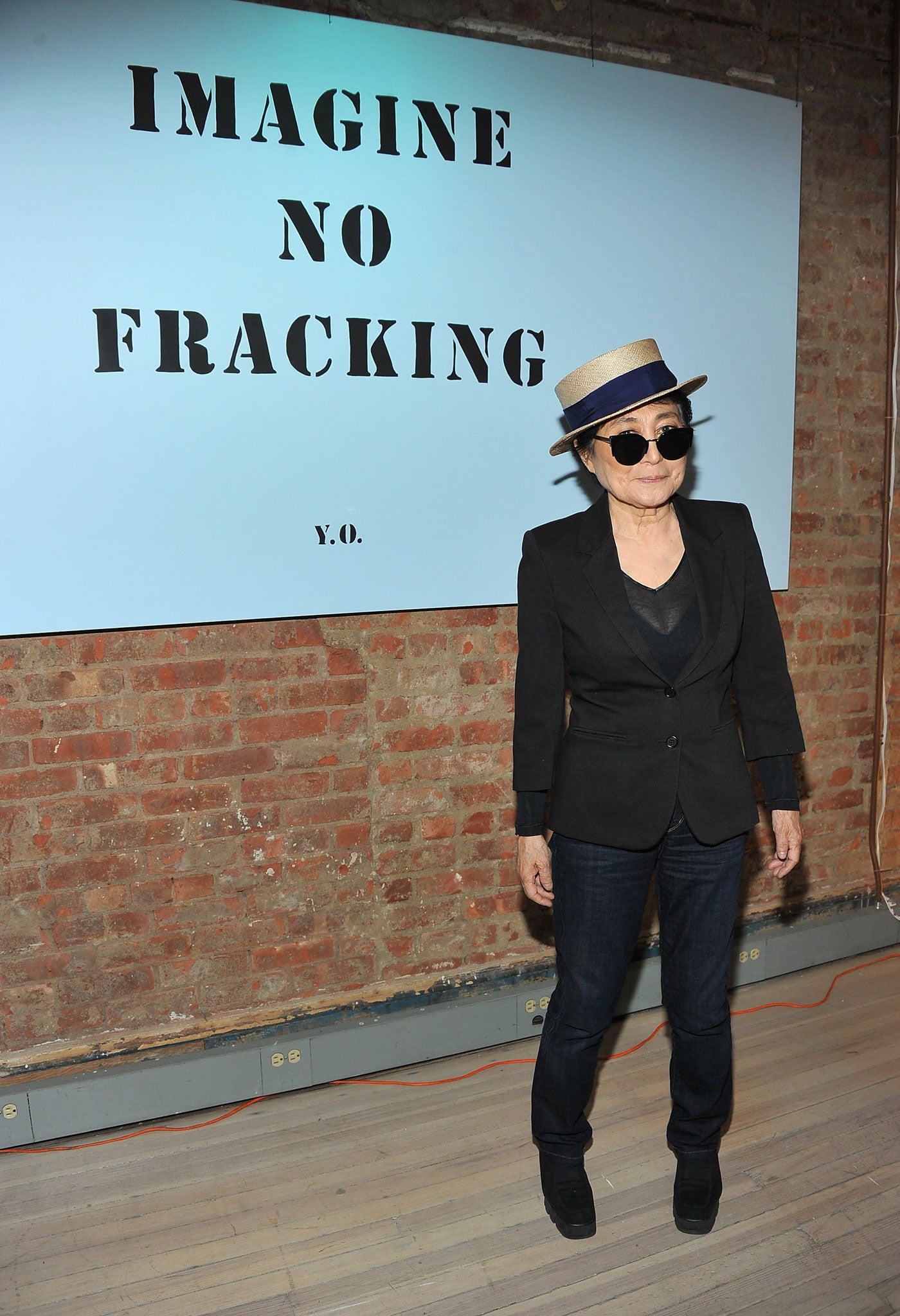'I was doing this before you were born': Yoko Ono on John Lennon, infidelity and making music into her eighties
With her latest album out this month, Yoko Ono talks to Fiona Sturges about why she's still working hard at 80 - and forewarns of the countdown to Doomsday
I always knew she was small but, even so, I'm not quite prepared for how teeny and bird-like Yoko Ono is. Or, come to think of it, how glamorous. The home movies taken by her and Lennon in the 1970s reveal a figure with big, fluffy hair and pensive, wary features. But the woman sitting next to me is smiling broadly and is stylishly clad in dark jeans, tight black sweater and chunky boots. Her hair is cropped and spiky and her signature sunglasses sit halfway down her nose, her eyes twinkling over the top. She is part rock star, part sexy librarian.
We meet in an apartment in a smart hotel in the centre of Helsinki, her latest stop during a short European tour with Thurston Moore of alt-rock band Sonic Youth. It seems impertinent to mention her age, except that it's so very startling. Yoko, whom the night before our interview I witnessed shrieking, ululating and prancing about on stage in front of a rapt audience, is 80. Up close, she could pass for 50. The only creases on her face are laughter lines.
Yoko, I ask, do you ever think about taking it easy and just lolling about in the garden, watching the birds?
"Ahaha, no!" she giggles, waving a dismissive hand. "I don't think I'm there yet. Society tells you that when you're old you have to retire. You have to defy that. Please know that being 80 is not a scary thing. When you're 80, your life is much freer. I have energy. I walk a lot but also I work all the time. We don't live by just sleeping and eating. We need pride and dignity in our lives. Work gives you that. Art is like breathing for me. If I don't do it, I start to choke."
You don't so much interview Ono as sit in awe and offer the odd prompt while she shares her hard-won wisdom and hopscotches across the decades. Some of my questions are ignored, others answered 10 minutes after I've asked them, but it doesn't matter. Her memories are freighted with history.
Prior to our meeting, I had imagined that Ono, dubbed by her third husband John Lennon "as the world's most famous unknown artist", might have grown weary of discussing her years as a Beatle wife, but I was wrong. She delights in talking about their life together.
Of course, she has spent more than half a lifetime being pilloried for her relationship with Lennon, whom she first met in 1966 and married in 1969. She is routinely blamed for the Beatles' split in 1970, having been painted as the evil temptress who took Lennon's focus off the band while hanging on the coattails of his celebrity. In 1974, she hit back at the misogyny and racism levelled at her – the two most grimly converging in a 1970 Esquire feature entitled "John Rennon's Excrusive Gloupie" – with the song "Yes, I'm a Witch" ("I'm a witch, I'm a bitch, I don't care what you say. My voice is real, my voice speaks truth, I don't fit in your ways").
If 45 years as a pariah has weighed heavily on her, she hides it well. While in the past she has admitted to moments of fury, she tells me "that world [of vitriol] is mostly blocked out to me. John and I were both musicians and, at the same time, artists and film-makers and activists. We had so much to talk about. So we were busy with our own lives, and people saying bad things about us was very far away. I have had an incredible life. I don't mean that in a fairy-tale way, but an incredible and busy working life."

And the work continues. In a fortnight she will release a new album, Take Me to the Land of Hell. As is customary on her LPs, a sizeable portion is taken up with the primal, guttural howling that has, over the years, proved enormously potent to some and nerve-shreddingly awful to others. But there are also moments of quiet melancholy, of tenderness and beauty. Were the album made by an artist 60 years her junior, it would seem an accomplished excursion into avant-garde ambient and noise-rock. Coming from the octogenarian Ono, it's plain remarkable.
She says she doesn't listen much to new music; the music she makes is entirely instinctive. "People tell me this kind of music is young people's music, and I tell them, 'I was doing this kind of music before you were born.'" Her son Sean Lennon co-produces her albums, and advises her on collaborations (Take Me to the Land of Hell features guest appearances from the hip-hop artist Questlove, Wilco's Nels Cline and Lenny Kravitz). "In the studio I'm hands-on but I listen to my son. He is my musical director now. I will talk to him about getting someone to play. I say, 'Why not get so-and-so?' and he says, very gently as he knows my rebellious nature, 'No Mummy, please get these people. They know your work and they love it.' And I go, 'OK, then.'"
Among the performers currently expressing their appreciation for Ono is Lady Gaga, whose work similarly blurs the boundaries between music and conceptual art. Indeed, in recent years there has been a ground swell of support for Ono, a belated recognition of her role as both a cultural pioneer and an activist of rare passion and spirit (she is currently leading a star-studded campaign against fracking).
In 2009, she was awarded the Lifetime Achievement Golden Lion at the Venice Biennale, while, earlier this year, she was asked to curate the Southbank Centre's Meltdown festival, an honour previously bestowed upon David Bowie, Patti Smith and Scott Walker. Has she, I wonder, noticed a greater acceptance?
"Acceptance? Probably yes," she replies blankly. "But it's a strange thing. This is what you observe, though I don't think in those terms."
Let me put it a different way, I say. Perhaps the world has come around to your way of thinking. She nods in agreement. "Yes, you know this has happened a lot for me. For instance, for a long time I've been talking about fracking and how damaging it is, and the word is really spreading now. It's great to see."
She is a firm believer in what she calls "people's power". "We can make positive things happen," she says, "by enveloping the planet with love and wisdom. You have to remember that people are the majority and the people who are supposedly controlling us are the minority. They only do what they do because we have become sheep. But I think our understanding about life is getting increasingly strong and wise."
The previous night Ono told her audience that heaven on Earth will arrive in 2050. What did she mean? "Ah yes, this is because everyone is stuck in this idea that there's going to be a Doomsday," she says. "And it's so silly. Doomsday sounds like a very comfortable thing to happen. We all die together. Oh great! But I have seen things in Hiroshima and it doesn't happen that way. You don't just die right away, there's this very slow death and each one is different. You are not all together. All of us will be very hungry because everything will be destroyed. Starvation and illness, those are the things that are going to happen. Do you want to choose that, or do you want to make sure this planet is going to be better and that it has a future?"
I remark on how she is hailed as a feminist crusader, battling against traditional notions of femininity (among the many objections to her relationship with Lennon was her perceived plainness and her refusal to play the mute clothes horse) and pursuing her own path in the face of ferocious, and mostly male, opposition. In 1951, she was the first female student to be granted a place to study philosophy at Tokyo's Gakushuin University. Even then, I note, she was chipping away at the patriarchal order.
"Well, back then I was not intentionally fighting," she reflects, "but maybe my existence defied the roles given to women. I knew that if you allow them, women bring out their true self, which is strong and talented and powerful. But the world didn't want to know about that. The world wanted to keep women down."

When she first met Lennon, when he wandered into her one-woman show at a London art gallery, he was, she says "this macho guy. I was observing him and I wasn't impressed at all, though I understood his vulnerable side." In 1972, he would publicly acknowledge his chauvinism and, inspired by an excerpt of Yoko's instructional book Grapefruit, write the song, "Woman is the Nigger of the World". It's quite an achievement, I tell her, to have turned a Beatle into a feminist.
"As I said," she replies, her eyes twinkling, "eventually things come around to the way I perceive them. If you are doing something logical, it prevails. I'm a very pragmatic person."
Did she hesitate before entering into a fully fledged relationship with Lennon? "Of course," she replies. "The main thing that made me hesitate was his entourage, as it was clear they hated me. I thought hard about whether I wanted to get into that situation. But we had so much in common, which was odd because he was from Liverpool and I was from Tokyo. We simply thought the same way about things." So love won out in the end? "Yes," she smiles. "Love won."
Born in 1933, Ono was the daughter of a classical-pianist-turned-banker father and a painter mother. Her well-to-do family hoped she would follow in her father's footsteps and become a concert pianist, though Ono had other plans. The family moved between New York and Tokyo throughout her childhood, though they were in Tokyo when war broke out and when the city was bombed in 1945, killing 100,000 people. The Onos soon found themselves exchanging family heirlooms for food.
At 18, after two semesters at Gakushuin, Ono dropped out and moved back to New York, enrolling at the Sarah Lawrence College, a liberal arts college known for its emphasis on the links between activism and creativity. There she forged connections with the fledgling avant-garde, among them the composer John Cage and members of the Fluxus group. In the 1960s, she began exhibiting and staging "happenings" – her most famous work "Cut Piece" found her sitting motionless as strangers snipped away at her clothing with scissors.
What did her parents think of her work? "My mother was intelligent and opinionated. The way she expressed how she felt was by not talking about it at all."
Following the breakdown of her first marriage to the composer Toshi Ichiyanagi, she met and married the American art promoter Tony Cox and had a daughter, Kyoko. The couple separated after Ono met Lennon, after which Cox re-married and joined a religious sect known as The Walk.
After a custody hearing over their daughter went in Ono's favour, Cox packed up his and Kyoko's belongings and vanished with her. With the help of the police and private investigators, Ono launched a worldwide search for her daughter but she was never traced. It later transpired that she and her father were moving from place to place on the West Coast of America and living under different names.
"It was a kidnapping, and it was terrible," Ono recalls mournfully. "It was different for her. She was OK and she didn't understand what was happening. She didn't suffer so much at the time, although later it was difficult for her to cope."

Aged 31 and expecting a child of her own, Kyoko got in touch with her mother in 1994, asking to meet her. "I didn't know what it was going to be like," says Ono. "I was very nervous. But she's a very intelligent and sensitive woman, I'm really very proud of her. We are friends now."
Without any prompting, Ono tells me about another low point in the 1970s, when she and Lennon separated. "The night that [the Democratic candidate] George McGovern lost the presidential election [to Richard Nixon], all of us were very upset," she recalls. "John got drunk and was out of it. Anyway, [the activist] Jerry Rubin invited all these people to his apartment, so we got in the car and went.
"John was staggering around and he went into another room – there were only two rooms and the walls were very thin – and he started making love to a woman. It was very loud and someone was kind and tried to turn up the music but, you know, it was Bob Dylan and he's pretty quiet. It was a very tense scene. The people who were invited there were mostly New York journalists, but they were very civilised about it."
The next day, Lennon apologised and spoke of the love he had for her that could overcome such a meaningless, drunken act. "But I felt, 'Well, if he can do this, forget it!' I mean, we were together and for a while he was behaving so well, I thought it must have been killing him. So I eventually told him, 'You go to LA, you do what you want to do and let's see what happens'."
The pair separated for 18 months, during which Lennon had a relationship with his assistant May Pang. But in late 1974, he and Ono reunited, after which she became pregnant with their son Sean. "It was great that I gave him that freedom," she recalls. "It was the logical choice. At the time I thought to myself, 'Well, I can do whatever I want to do, too.'" She pauses and laughs. "But it didn't work out that way. Can you believe it?"
Ono still lives in the Dakota building in New York where she lived with Lennon and where, outside the entrance, he was shot dead by Mark Chapman in 1980. "People ask me, 'Why are you still living in the place where the tragedy happened?'" she tells me. "I say, 'It was our home. You don't just leave home.'"
She is, she says, a very private person, though she is frequently spotted by admirers who go up and talk to her. "Given all that has happened in life, I will not complain about that. I suppose I don't go to the theatre so much, because I get stuck in the dark with people talking to me. Most of the time I go outside in the early morning when I don't get too hassled."
All these years after Lennon's death, I ask Ono what it's like, talking endlessly about him. "It's fine, it's fine. I miss him and when people talk about him and ask me things, they make it sound like he's still around." She smiles and adds: "And that makes me feel happy."
Yoko Ono Plastic Ono Band's new album, 'Take Me to the Land of Hell', is released 16 September on Chimera Music
Yoko Ono: A life
How the avant-garde artist and peace activist changed the world and the way we see it…
1935 Yoko Ono poses for a portrait with her mother, Isoko, and father, Eisuke, when she was two-and-a-half in San Francisco, California
1965 The Bandaged Orchestra appear at the Fluxus Festival arranged by Yoko Ono in New York
1969 John Lennon and Yoko Ono on honeymoon in Amsterdam, spending a week in bed at the Hilton Hotel to protest against world violence
1969 Yoko Ono with John Lennon at London's Heathrow airport. With them is Kyoko, Yoko's daughter from her previous marriage
1980 John Lennon was shot dead outside the home in New York in which Ono still lives
2009 Yoko Ono and Mark Ronson perform on stage as part of Meltdown at the Royal Festival Hall in London
2013 Yoko Ono at the Imagine No Fracking installation she created at ABC Home & Carpet in New York in April
Join our commenting forum
Join thought-provoking conversations, follow other Independent readers and see their replies
Comments
Bookmark popover
Removed from bookmarks